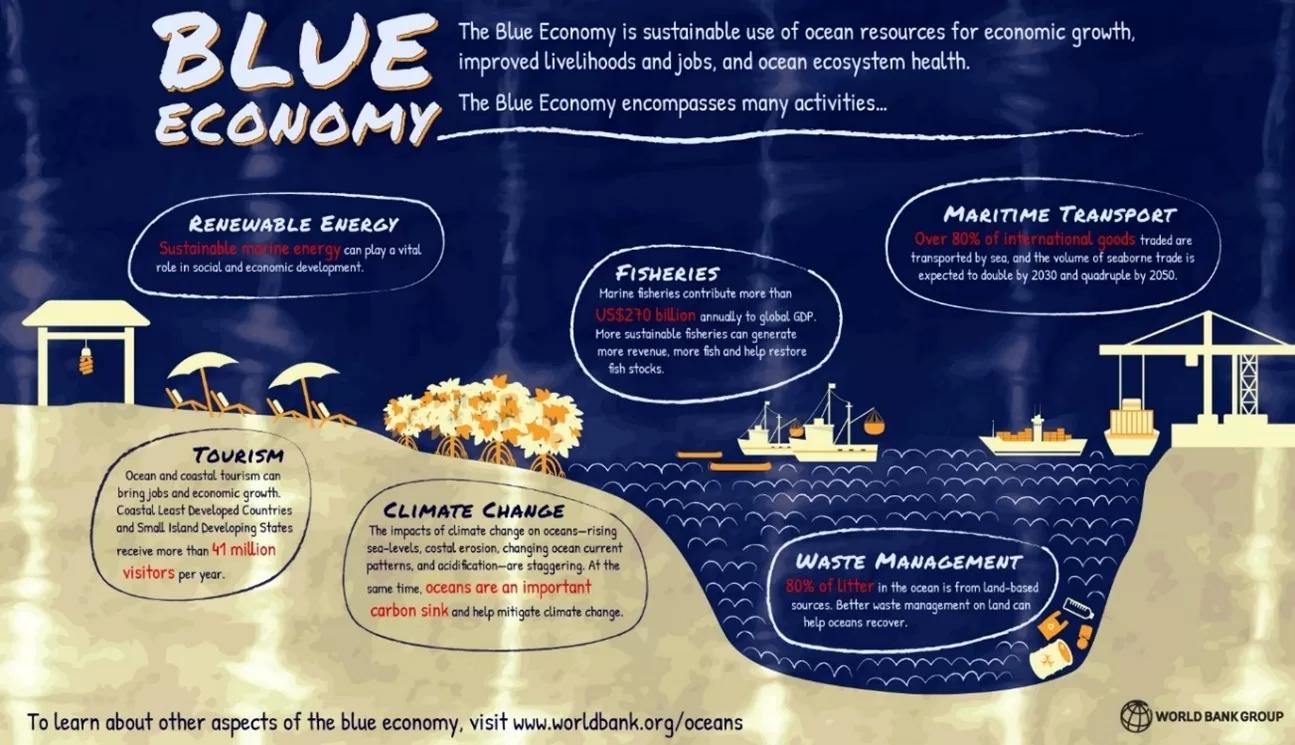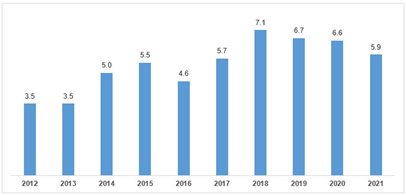Economics
Context: Recently, G20 Environmental and Climate Sustainability Working Group discussed issues of land degradation, blue economy and the circular economy.
About Blue Economy:

- According to the World Bank, It is defined as the “sustainable use of ocean resources for economic growth, improved livelihoods, and jobs while preserving the health of the ecosystem.”
- The blue economy offers coastal nations like India a huge socioeconomic opportunity to responsibly use ocean resources for societal benefit.
- The rise in demand of ocean-linked products such as seafood, energy generation, etc. has led to the growth of the blue economy globally, with estimated global turnover ranging between US$ 3-6 trillion annually.
- The concept began seeping into the consciousness of academics and policymakers after the United Nations Conference on Sustainable Development in 2012.
Significance of India’s Blue Economy:

- Below image shows Indian Marine Exports (in US$ Billions).
- India’s blue economy: It is a subset of the national economy comprising the entire ocean resources system and human-made economic infrastructure in marine, maritime, and onshore coastal zones within the country’s legal jurisdiction.
- India is strategically located between two important plug points called Strait of Hormuz and Strait of Malacca, through which most of trade in commercial shipping moves in the Indian Ocean.
- Coastal states and islands: With some 7,500 kilometres, India has a unique maritime position.
- Nine of its 29 states are coastal, and it’s geography includes 1,382 islands.
- Ports and Exclusive Economic Zone: There are nearly 199 ports, including 12 major ports that handle approximately 1,400 million tons of cargo each year.
- Besides, India’s Exclusive Economic Zone of over 2 million square kilometres has a bounty of living and non-living resources with significant recoverable resources such as crude oil and natural gas.
- Coastal settlements: The coastal economy sustains over 4 million fisherfolk and coastal communities.
Govt of India Initiatives to promote sustainable blue economy:
- Sagarmala Project: Vision of the Sagarmala Programme is to reduce logistics cost for export-import and domestic trade with minimal infrastructure investment.
- Coastal Economic Zones: The government identifies CEZs in the National Perspective Plan for Sagarmala Programme.
- CEZs aims to promote exports by providing infrastructure and facilities to entrepreneurs to set up businesses and industries near Ports.
- Indian Ocean Rim Association: India has been taking active participation in the IORA for promotion of blue economy in Indian Ocean littoral states.
- Matsya Sampada Yojana: It is a flagship scheme for focused and sustainable development of the fisheries sector in the country.
- It will bring about the Blue Revolution by harnessing fisheries’ potential in a sustainable, responsible, inclusive and equitable manner.
- Polymetallic Nodules: India has received the sanction from International Seabed Authority for deep-sea mining in the Central Indian Ocean.
- Deep Ocean Mission: It was launched with an intention to develop technologies to harness the living and non-living resources from the deep-oceans.
- India-Norway Task Force on Blue Economy for Sustainable Development: It was inaugurated jointly by both the countries in 2020 to develop and follow up joint initiatives between the two countries.
Way Forward:
With its vast maritime interests, the blue economy occupies a vital potential position in India’s economic growth. It could well be the next multiplier of GDP and well-being, provided sustainability and socio-economic welfare are kept centre-stage.
India should look to adopt the Gandhian approach of balancing economic benefits with sustainability for meeting the broader goals of growth, employment generation, equity and protection of environment.
Source: Down To Earth











